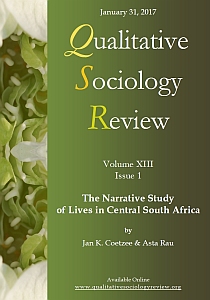Between Enslavement and Liberation. Narratives of Belonging from Two Farm Workers in Rural South Africa
DOI:
https://doi.org/10.18778/1733-8077.13.1.02Keywords:
Interpretive Sociology of the Everyday, Narratives of Belonging, Farm Workers in Post-Apartheid South AfricaAbstract
More than two decades after the genesis of South Africa’s aspirational democracy in 1994, deep-seated forms of inequality still exist. These are explored in the narratives of two farm workers who tell of events and experiences in their everyday lives. In probing the everyday, we turn the spotlight on phenomena, events, and experiences that are simultaneously familiar yet perplexing, taken-for-granted yet questionable, tangible yet elusive. As a backdrop to the sociology of the everyday, key ideas from three social theorists — Randall Collins, Jeffrey Alexander, and Vanessa May — guide our interpretation of excerpts from the farm workers’ narratives. The farm workers’ stories are also juxtaposed with reflections on the socio-political, economic, and emotional contexts of slavery and serfdom.
Downloads
References
Alexander, Jeffrey C. 2012. Trauma: A Social Theory. Cambridge: Polity Press.
Google Scholar
Andreasson, Stefan. 2010. Africa’s Development Impasse: Rethinking the Political Economy of Transformation. London: Zed Books.
Google Scholar
DOI: https://doi.org/10.5040/9781350218185
Anti-Slavery. n.d. Retrieved May 05, 2014: http://www.antislavery.org
Google Scholar
Antonsich, Marco. 2010. “Searching for Belonging: An Analytical Framework.” Geography Compass 4(6):644-659.
Google Scholar
DOI: https://doi.org/10.1111/j.1749-8198.2009.00317.x
Berger, Peter L. and Thomas Luckmann. 1967. The Social Construction of Reality. Garden City, NY: Anchor Books.
Google Scholar
Coetzee, Jan K. 2001. “A Micro-Foundation for Development Thinking.” Pp. 118-139 in Development: Theory, Policy, and Practice, edited by J. K. Coetzee, J. Graaff, F. Hendricks, and G. Wood. Cape Town: Oxford University Press Southern Africa.
Google Scholar
Collins, Randall. 1981. “On the Microfoundations of Macrosociology.” American Journal of Sociology 86(5):984-1014.
Google Scholar
DOI: https://doi.org/10.1086/227351
Collins, Randall. 2004. Interaction Ritual Chains. Princeton: Princeton University Press.
Google Scholar
DOI: https://doi.org/10.1515/9781400851744
Cornell, Drucilla and Kenneth M. Panfilio. 2010. Symbolic Forms for a New Humanity. New York: Fordham University Press.
Google Scholar
DOI: https://doi.org/10.5422/fso/9780823232505.001.0001
Department of Justice and Constitutional Development. 2009. The Constitution of the Republic of South Africa (1996). Pretoria: Department of Justice and Constitutional Development.
Google Scholar
Fanon, Frantz. 1963. The Wretched of the Earth. London: Penguin.
Google Scholar
Fanon, Frantz. 1968. Black Skin, White Masks. London: Pluto Press.
Google Scholar
Gibson, Nigel C. 2011. Fanonian Practices in South Africa. New York: Palgrave Macmillan.
Google Scholar
Gossage, J. Phillip. et al. 2014. “Alcohol Use, Working Conditions, Job Benefits, and the Legacy of the ‘Dop’ System among Farm Workers in the Western Cape Province, South Africa: Hope Despite High Levels of Risky Drinking.” International Journal of Environmental Research and Public Health 11(7):7406- 7424.
Google Scholar
DOI: https://doi.org/10.3390/ijerph110707406
Guibernau, Montserrat. 2013. Belonging: Solidarity and Division in Modern Societies. Cambridge: Polity Press.
Google Scholar
Habermas, Jürgen. 1984. The Theory of Communicative Action, vol. I. Boston: Beacon Press.
Google Scholar
Habermas, Jürgen. 1987. The Theory of Communicative Action, vol. II. Boston: Beacon Press.
Google Scholar
Hooks, Bell. 2009. Belonging: A Culture of Place. New York: Routledge.
Google Scholar
DOI: https://doi.org/10.4324/9780203888018
Leibbrandt, Murray et al. 2010. “Trends in South African Income Distribution and Poverty Since the Fall of Apartheid.” OECD Social, Employment and Migration Working Papers 101. Parys: Directorate for Employment, Labour and Social Affairs (Organisation for Economic Cooperation and Development).
Google Scholar
May, Theresa. 2013. Slavery Bill Promises Life Terms for Traffickers. Retrieved May 05, 2014: https://news.sky.com/story/slavery-bill-promises-life-terms-for-traffickers-10424486
Google Scholar
May, Vanessa, ed. 2011a. Sociology of Personal Life. Basingstoke: Palgrave Macmillan.
Google Scholar
DOI: https://doi.org/10.1007/978-0-230-34421-1_1
May, Vanessa. 2011b. “Self, Belonging and Social Change.” Sociology 45(3):363-378.
Google Scholar
DOI: https://doi.org/10.1177/0038038511399624
Miller, Linn. 2003. “Belonging to Country: A Philosophical Anthropology.” Journal of Australian Studies 27(76):215-223.
Google Scholar
DOI: https://doi.org/10.1080/14443050309387839
Office of the High Commissioner for Human Rights. n.d. Retrieved May 05, 2014: http://www.unhchr.ch
Google Scholar
Olshan, Mark A. 1983. “Development as the Restoration of Meaning.” Free Inquiry in Creative Sociology 11(1):13-18.
Google Scholar
OUP. 2002. South African Concise Oxford Dictionary. Oxford: Oxford University Press Southern Africa.
Google Scholar
Perroux, François. 1983. A New Concept of Development. London: Croom Helm.
Google Scholar
Rumford, Chris. 2013. The Globalization of Strangeness. London: Palgrave Macmillan.
Google Scholar
DOI: https://doi.org/10.1057/9781137303127
Steele, Jonathan. 1994. “Slave Mentality Dictates Mandela’s Pace of Change.” The Guardian August, p. 18.
Google Scholar
Sztompka, Piotr. 2008. “The Focus on Everyday Life: A New Turn in Sociology.” European Review 16(1):23-37.
Google Scholar
DOI: https://doi.org/10.1017/S1062798708000045
Terreblanche, Samuel. 2003. A History of Inequality in South Africa 1652-2002. Pietermaritzburg: University of Natal Press.
Google Scholar
United Nations’ Supplementary Convention on the Abolition of Slavery, the Slave Trade, and the Institutions and Practices Similar to Slavery. 1956. Retrieved May 02, 2014: http://treaties.un.org
Google Scholar
van Onselen, Charles. 1996. The Seed Is Mine. The Life of Kas Maine, a South African Sharecropper. Cape Town: David Philip.
Google Scholar
Waldmeir, Patti. 1997. Anatomy of a Miracle: The End of Apartheid and the Birth of the New South Africa. New York: Norton.
Google Scholar
Wells, Thomas. n.d. “Sen’s Capabilities Approach.” Internet Encyclopedia of Philosophy. Retrieved May 05, 2014: http://www.iep.utm.edu/sen-cap/
Google Scholar
Woolman, Stuart and Michael Bishop. 2007. “Down on the Farm and Barefoot in the Kitchen: Farm Labour and Domestic Labour as Forms of Servitude.” Development Southern Africa 24(4):595-606.
Google Scholar
DOI: https://doi.org/10.1080/03768350701577764
Yuval-Davis, Nira. 2006. “Belonging and the Politics of Belonging.” Patterns of Prejudice 40(3):197-214.
Google Scholar
DOI: https://doi.org/10.1080/00313220600769331
Downloads
Published
How to Cite
Issue
Section
License

This work is licensed under a Creative Commons Attribution-NonCommercial-NoDerivatives 4.0 International License.











